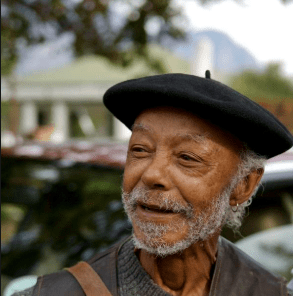His name is James Matthews, one of Africa’s writers who has paid the price for using his writing as a mouthpiece during the years of apartheid in his own country South Africa. However, James is one of the few African writers to have survived through the harsh years and treatment from the government and made it out alive to share his experiences, unlike a few others who unfortunately lost their lives.
Born May 29, 1929, James Matthews, now referred to as Ntate James as a sign of respect, is a 90-year-old South African poet, writer and publisher. Born at a time when his country was recovering from the years of several wars and adjusting to complete colonisation under the British rule, he is one of the few African writers alive who have seen the years of post-war Africa including colonization, struggle for independence, post-independence and the apartheid system.
The award-winning writer and publisher discovered his talent when he was 14 years old in grade 10 when his English composition teacher had marked his essay a 21 over 20 after a class assignment they were given. Growing up in District Six, Cape Town with illiterate parents.
An educated James became a young man in his 20s before he saw a library after he was sent as a messenger to return books by a lady worker at Cape Times. It was there that he developed a great habit of reading which also had a huge impact on his writing.

Not being able to go to university, James found work in several places working in media for several years before his writing would be noticed. At a point in time, when he was only 17, he worked as a journalist and columnist contributing to several national newspapers such as the Drum and Golden City Post. He also worked for a few private newspapers.
By the 1950s, James began to publicly share his works and send several out for publication becoming a household writer and leader of black consciousness in apartheid South Africa. In 1972, he published his first book, Cry Rage, a collection of poetry heavily inspired by the apartheid system that became a national bestseller in weeks and caused him to be targeted by the apartheid government.
Although he was constantly harassed by the government between 1972 and 1976, James worked hard and established Gallery Afrique, the first black-owned art gallery in South Africa which was well patronised although constantly shut down. He went on to establish BLAC (Blac Literature Arts and Culture), the first black-owned publishing house in South Africa which operated until 1991 when it had to close down due to constant issues with the government.
After producing several more works and leading black artists to express their social issues through their arts, James was finally arrested by the government in 1976 and spent 13 years in prison plus a few more years living without official identity in the country. He was prevented from having a passport.
His run-ins with the government which came with threats did not deter him from doing what he loves best but rather gave him more reasons to write about the unjust system in the country.
In 1987, after successfully helping to establish the Congress of South African Writers, he was appointed as its patron helping to draw its aims and objectives.
He went on to publish other books including a novel which have taken him around Europe speaking at top universities and gaining a fellowship in the U.S. despite his passport ban. In 2000, he established another publishing firm to publish more black writers and poets.

In 2004, he was given a national award for his contribution to South African literature and journalism. In 2013 and 2016, he received honorary doctorates from the University of the Western Cape and Rhodes University in Grahamstown respectively.
His other awards include Woza Afrika Award in 1978, the Kwaza Honours List – Black Arts Celebration from the USA, Chicago in 1979 and the Freeman of the towns of Lehrte and Nienburg, Germany in 1982.
James currently lives in South Africa where he visits schools to give lectures and discuss writing as a black South African.










